My friend and I were lucky enough to be in Paris for the French National Day, and of course we couldn’t afford to miss the two main celebrations, namely the military parade and fireworks.
The military parade is a chance for the French armed forces to strut their stuff, now that they don’t really have many deployments to attend! The parade started off with the arrival of president Jacques Chirac surrounded by cavaliers in front and behind him, in a scene reminiscent of the ancient royals. Soon, fighter jets flew over the spectator crowd and left a trail of the tricolour of France – blue, white and red in the sky. Other military aircrafts passed over us afterwards in low altitude. Although the scenes of aircrafts in parade are quite familiar from watching TV in the past, it was still the first time I saw so many flying aircrafts at such a close distance. The army later also put on a formidable show with their armoured vehicles, transport trucks, tanks and other vehicles racing down Avenue des Champs Élysées. Were they practising for a Formula 1 race or preparing themselves against the next riot of Paris?
Just when the Arc de Triomphe re-opened at the end of the military parade, my friend and I rushed there before the flood of other tourists set in. The inside walls of the Arc listed all the victories of Napoleon for visitors to admire the glorious military history of France. There was also a memorial plaque for an unknown soldier who sacrificed for France.
We spent the afternoon visiting other places before heading to the Jardin du Trocadéro, opposite to the Eiffel Tower, in order to find a spot to watch the fireworks at night. The fireworks this year was accompanied by Beethoven’s symphony music in commemoration of his 250th anniversary of his death. However, we felt that the range of music was too soft for the atmosphere of fireworks and Mozart would have made a better choice! It was certainly memorable and worthwhile to watch fireworks near the Eiffel on that special day, but honestly I won’t do that every year. The mad rush to leave did put me off! The Paris Métro ran at a reduced frequency on National Day and all the trains were exceptionally crowded. We had to change trains twice and were lucky enough to get on board the first trains on arrival. Many others were not so lucky, though. So my most important advice for visiting Paris is: expect queues, expect crowds and be patient!
If you want to see the last minute of the fireworks, please click on this link:
http://www.youtube.com/watch?v=dHaf3YmD-44
難得在巴黎的第三日正值法國國慶,自不然要趁熱鬧看兩大國慶節目——軍事巡遊及煙花(煙火)匯演。
法國軍隊現少用武之地,軍事巡遊正是顯示實力的機會。巡遊開始時,先由前後各一列騎兵擁簇着希拉克總統出場,情景就像古代皇帝出巡一樣。沒多久,一列戰鬥機掠過,噴出法國國旗藍、白、紅三色,然後其他軍機亦陸續在低空飛過,雖然這些場面從前在電視看過,但在近距離看到這麼多軍機還是第一次。陸軍的陣容也不弱,不同的裝甲車、運輸車、坦克車及其他軍車沿着香榭麗舍大道奔馳,有點像賽車,還是為下次巴黎暴亂演習?
巡遊完畢,趁凱旋門剛解封,遊人未湧至時,我和朋友趕緊前往參觀。凱旋門的牆壁盡烈拿破崙勝出的戰役,讓人懷緬法國光輝的過去,還有記念一個為法國捐軀的無名戰士的墓碑。
玩了一個下午,黃昏時趕緊到艾菲爾鐵塔對面的Trocadéro公園霸一個有利位置等看煙花(煙火)。今年是貝多芬逝世250周年,煙花配樂也特地選用其交響曲,衹不過選樂太柔和,不太襯托煙花的澎湃,我的朋友說不如用莫扎特更好。能在鐵塔看煙花的確難忘,也是值得,不過年年如此我也怕怕,怕在散場時擠地鐵,國慶假期班次少,我們算幸運,回酒店換兩次車,每次也擠得上等車後的首班車,可憐不少人要再苦等一、兩班車。我給大家遊巴黎最重要的心得,就是無論到哪裡,一定要不怕等、不怕擠!
如欲觀看最後一分鐘的煙花影片,請點擊以下連結:
http://www.youtube.com/watch?v=dHaf3YmD-44
The Military Parade 軍事巡遊
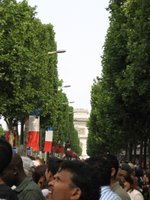

Champs Élysées, before (left) and after the parade (right)
香榭麗舍大道——巡遊前(前)及巡遊後


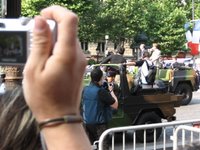
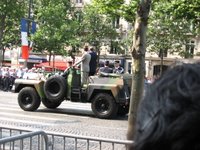
The President arrives - 'Look here, Jacques!'
總統駕到——「望過來啊!」

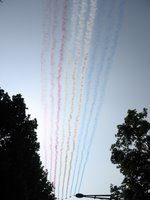
'Sky graffiti', state sanctioned!
國家特准,「天空塗鴉」

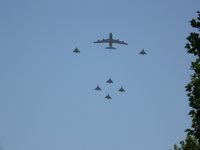
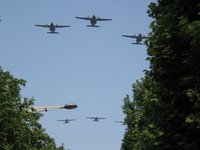
Other aircrafts 其他軍機
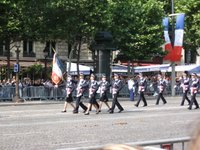
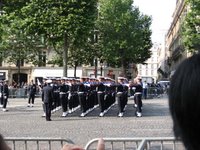
Marches 步操
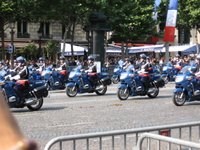
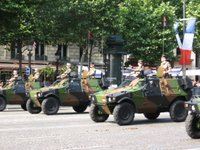




Military vehicles 各類軍車
Arc de Triomphe 凱旋門
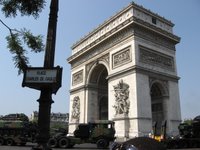
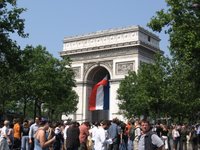

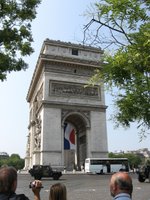
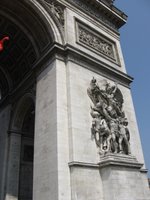


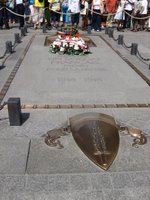
The military parade is a chance for the French armed forces to strut their stuff, now that they don’t really have many deployments to attend! The parade started off with the arrival of president Jacques Chirac surrounded by cavaliers in front and behind him, in a scene reminiscent of the ancient royals. Soon, fighter jets flew over the spectator crowd and left a trail of the tricolour of France – blue, white and red in the sky. Other military aircrafts passed over us afterwards in low altitude. Although the scenes of aircrafts in parade are quite familiar from watching TV in the past, it was still the first time I saw so many flying aircrafts at such a close distance. The army later also put on a formidable show with their armoured vehicles, transport trucks, tanks and other vehicles racing down Avenue des Champs Élysées. Were they practising for a Formula 1 race or preparing themselves against the next riot of Paris?
Just when the Arc de Triomphe re-opened at the end of the military parade, my friend and I rushed there before the flood of other tourists set in. The inside walls of the Arc listed all the victories of Napoleon for visitors to admire the glorious military history of France. There was also a memorial plaque for an unknown soldier who sacrificed for France.
We spent the afternoon visiting other places before heading to the Jardin du Trocadéro, opposite to the Eiffel Tower, in order to find a spot to watch the fireworks at night. The fireworks this year was accompanied by Beethoven’s symphony music in commemoration of his 250th anniversary of his death. However, we felt that the range of music was too soft for the atmosphere of fireworks and Mozart would have made a better choice! It was certainly memorable and worthwhile to watch fireworks near the Eiffel on that special day, but honestly I won’t do that every year. The mad rush to leave did put me off! The Paris Métro ran at a reduced frequency on National Day and all the trains were exceptionally crowded. We had to change trains twice and were lucky enough to get on board the first trains on arrival. Many others were not so lucky, though. So my most important advice for visiting Paris is: expect queues, expect crowds and be patient!
If you want to see the last minute of the fireworks, please click on this link:
http://www.youtube.com/watch?v=dHaf3YmD-44
難得在巴黎的第三日正值法國國慶,自不然要趁熱鬧看兩大國慶節目——軍事巡遊及煙花(煙火)匯演。
法國軍隊現少用武之地,軍事巡遊正是顯示實力的機會。巡遊開始時,先由前後各一列騎兵擁簇着希拉克總統出場,情景就像古代皇帝出巡一樣。沒多久,一列戰鬥機掠過,噴出法國國旗藍、白、紅三色,然後其他軍機亦陸續在低空飛過,雖然這些場面從前在電視看過,但在近距離看到這麼多軍機還是第一次。陸軍的陣容也不弱,不同的裝甲車、運輸車、坦克車及其他軍車沿着香榭麗舍大道奔馳,有點像賽車,還是為下次巴黎暴亂演習?
巡遊完畢,趁凱旋門剛解封,遊人未湧至時,我和朋友趕緊前往參觀。凱旋門的牆壁盡烈拿破崙勝出的戰役,讓人懷緬法國光輝的過去,還有記念一個為法國捐軀的無名戰士的墓碑。
玩了一個下午,黃昏時趕緊到艾菲爾鐵塔對面的Trocadéro公園霸一個有利位置等看煙花(煙火)。今年是貝多芬逝世250周年,煙花配樂也特地選用其交響曲,衹不過選樂太柔和,不太襯托煙花的澎湃,我的朋友說不如用莫扎特更好。能在鐵塔看煙花的確難忘,也是值得,不過年年如此我也怕怕,怕在散場時擠地鐵,國慶假期班次少,我們算幸運,回酒店換兩次車,每次也擠得上等車後的首班車,可憐不少人要再苦等一、兩班車。我給大家遊巴黎最重要的心得,就是無論到哪裡,一定要不怕等、不怕擠!
如欲觀看最後一分鐘的煙花影片,請點擊以下連結:
http://www.youtube.com/watch?v=dHaf3YmD-44
The Military Parade 軍事巡遊


Champs Élysées, before (left) and after the parade (right)
香榭麗舍大道——巡遊前(前)及巡遊後




The President arrives - 'Look here, Jacques!'
總統駕到——「望過來啊!」


'Sky graffiti', state sanctioned!
國家特准,「天空塗鴉」



Other aircrafts 其他軍機


Marches 步操






Military vehicles 各類軍車
Arc de Triomphe 凱旋門








Comments